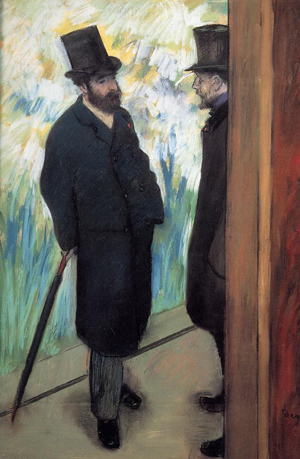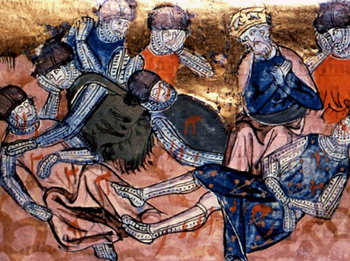True Love Is Proved by
Dedication & Combativity
In a recent meeting, I had the occasion to affirm that the there is no
Catholic spirit without the Crusader spirit. I was asked to develop this
theme. This is what I will do here.
The question of the Crusader spirit is rooted in the very constitution of the human spirit and mentality.
It is proper for a man, after original sin, when he loves something, to love it for his own pleasure, for the advantage it brings him, and not moved by dedication.

Enjoying the company of a friend does not demand dedication
A husband and wife can find each other's company very agreeable, giving them pleasure, but not calling for dedication. Because dedication supposes sacrifice, and it is evident that human nature flees from sacrifice. Every human creature has a horror of sacrificing himself. The world flees from onerous sacrifices.
It is because of this that in relation to the Catholic Church and her doctrine – including to Our Lord Jesus Christ and Our Lady – we look and we see something very good and admirable and, thus, we seek her benefits. For example, we come to the conclusion that Our Lady loves us very much and is going to grant us some benefits. So, we pray to her and deem everything is perfect, all is going very well.
But, when the occasion arises to dedicate ourselves, to do something for Our Lady, our position of soul is quite different. We are all satisfied when she does something for us; we draw back when it is a matter of doing something for her. We do not want to sacrifice. This is the misery of the human spirit, which is continuously like this.
There is no friendship without the spirit of sacrifice
It happens that true love, true dedication, true friendship, true idealism, only exists where there is the spirit of sacrifice. When one is not disposed to dedicate himself, any talk of friendship or declaration of affection is empty. Either the person proves his affection, his friendship, his idealism with deeds that cost him something or he ends by proving that he lacks true affection, true dedication.

Charlemagne discovers the body of Roland, who gave his life for the Emperor and the Catholic cause
His reply, "Ah, not this! This is something altogether different."
I conclude, then, that his words meant nothing. Because, either the friendship he has for me leads him to some sort of dedication or it is not friendship. It is foolishness, emptiness, fantasy, sentimentalism, whatever word you choose. One can even call it hypocrisy, because friendship is proved to the measure that a person is capable of dedicating himself to another.
There is a Roman saying that makes an interesting play of words, which is, amicus certus in re incerta, cernitur – we can discern a certain, secure friend during an uncertain time. This is very true. Friendship proves itself in the solidarity of the fight
Now, the occasion where we have most need of others, the time when friendship is best proven, is when we are attacked.
When some enemy takes a position against me, it is then that I know who my true friends are. Because if he remains indifferent in face of an attack against my person, then, as a friend, he fails. If in the hour of battle he just sits back and watches like a stranger, then he is not my friend. He is an acquaintance and nothing else, a vague sympathizer, but not a friend.
This is what happens in all occasions of life. When we have troubles or face a polemic where others take positions against us, we expect that those who say they are with us to be fighting on our side.
Adoration demands the combative spirit
Therefore, if it is true that friendship demands dedication and that the highest dedication is proved in the solidarity of the battle, then we arrive at the conclusion that, in relation to Our Lord Jesus Christ and the Church, there is no true dedication without the combative spirit. Where there is no combative spirit, there are only empty words and illusions.

One must not just pray, but be ready to take up the fight for love of God
I have the obligation to become indignant over the injuries made against Him, much more than for injuries made against myself. I have to be disposed to fight for Him even to the last drop of my blood, much more than if it were a matter just of my own self-interest.
This is the logical consequence of adoration, otherwise there is not real adoration. What does it mean to enter a church and make a Holy Hour, weeping and beating my breast, and afterwards leave and see a person who sins, who offends Our Lord, and look at him indifferently because he is not offending me. Of what worth is my Holy Hour? What was the sincerity of that love that I paid to Our Lord? What was the consequence of the love I was offering Him during that Holy Hour? It meant nothing; it is inconsistent.
To be sincere in my adoration and my worship, I am obliged to be combative.
Our obligations as sons of the Church
Let us take into consideration
- that Our Lord Jesus Christ is the head of the Mystical Body, which is the Church, and that she is militant;
- that on this earth she is attacked, denied, contested and betrayed;
- that if I have a militant spirit I must defend the Church whenever she is attacked.
Either it is like this or I should frankly admit that because of my pride, my confusion, I do not have a real spiritual life of piety. If the Church is militant and I am not militant alongside her, then, nothing makes sense and everything seems buffoonery.
